Mood and Emotion Regulation Laboratory (MER Lab)
Mailing Address
Cleveland State University
MER Lab
2121 Euclid Ave., PSY
Cleveland, OH 44115-2214
Campus Location
Union Building (UN)
1836 Euclid Ave., Rm. 602
Contact Us
Phone: 216.687.4576
merlab@csuohio.edu
Mood and Emotion Regulation Laboratory (MER Lab)

Here at the Mood and Emotion Regulation Laboratory (MER Lab), we are interested in understanding how people’s efforts to change their feelings are influenced by their physiological states and intra- and interpersonal environments. Our work seeks to integrate the roles of autonomic nervous system activity, attentional processes, interpersonal processes, and emotion regulation across laboratory and daily life environments to understand the mechanisms by which adolescents and adults become and stay depressed. We are also interested in understanding the mechanisms by which depression risk is passed on from parents to their children.
The long-term goal of this work is to identify novel targets for prevention and treatment efforts for depressive disorders. A more proximal goal is to leverage data collected within a biopsychosocial framework and machine learning algorithms to identify person-specific dynamic risk-factor patterns to predict emotional upheavals and regulation difficulties in people's everyday lives.
Please visit our Research page for information about our active studies and research personnel.
As articulated by others, science is a team sport. Projects from this lab are possible through the unwavering support of dedicated undergraduate and graduate student researchers who work hard to meet our research volunteers "where they are" in terms of scheduling and other needs. Over the past 10 years, their combined efforts have produced important findings that were disseminated through over 240 student-led presentations at regional and national conferences and multiple peer-reviewed publications.
Many of our student team members have further academic aspirations, and through their hard work, most continue on to pursue training at master's and doctoral levels: 96% of undergraduate team members who applied gained admission to Master's and other graduate programs and 79% of graduate team members were admitted into APA-accredited Doctoral programs in Clinical and Counseling Psychology (see tables below).
We invite you to learn more about our current and past team members by visiting our People page and more about their important research findings through our Conferences page.
MER Lab Graduate Student Members' Doctoral Program Outcomes (by Cohort Year)
| COHORT YEAR | # APPLIED | # ADMITTED | PERCENT |
|---|---|---|---|
| 2014 | 6 | 1 | 17% |
| 2015 | 3 | 3 | 100% |
| 2016 | 3 | 3 | 100% |
| 2017 | 5 | 5 | 100% |
| 2018 | 3 | 3 | 100% |
| 2019 | 3 | 3 | 100% |
| 2020 | 1 | 1 | 100% |
| 2021 | 2 | 1 | 50% |
| 2022 | 1 | 1 | 100% |
| 2023 | 1 | 1 | 100% |
Note. This table is updated retrospectively to reflect up-to-date student outcomes.
MER Lab Undergraduate Student Graduate Program Outcomes (by Year)
| YEAR | # APPLIED | # ADMITTED | PERCENT |
|---|---|---|---|
| 2016 | 4 | 4 | 100% |
| 2017 | 4 | 4 | 100% |
| 2018 | 5† | 5 | 100% |
| 2019 | 1 | 1 | 100% |
| 2020 | 2 | 2 | 100% |
| 2021 | 3 | 3 | 100% |
| 2022 | 3 | 2 | 67% |
| 2023 | 3 | 3 | 100% |
| 2024 | 1* | 1 | 100% |
Note. Outcomes include admission to a Master's in Clinical Psychology and Mental Health Counseling program unless otherwise noted. † n = 1 admitted to Medical School, *n = 1 admitted to Psy.D. program in Clinical Psychology
Mailing Address
Cleveland State University
MER Lab
2121 Euclid Ave., PSY
Cleveland, OH 44115-2214
Campus Location
Union Building (UN)
1836 Euclid Ave., Rm. 602
Contact Us
Phone: 216.687.4576
merlab@csuohio.edu